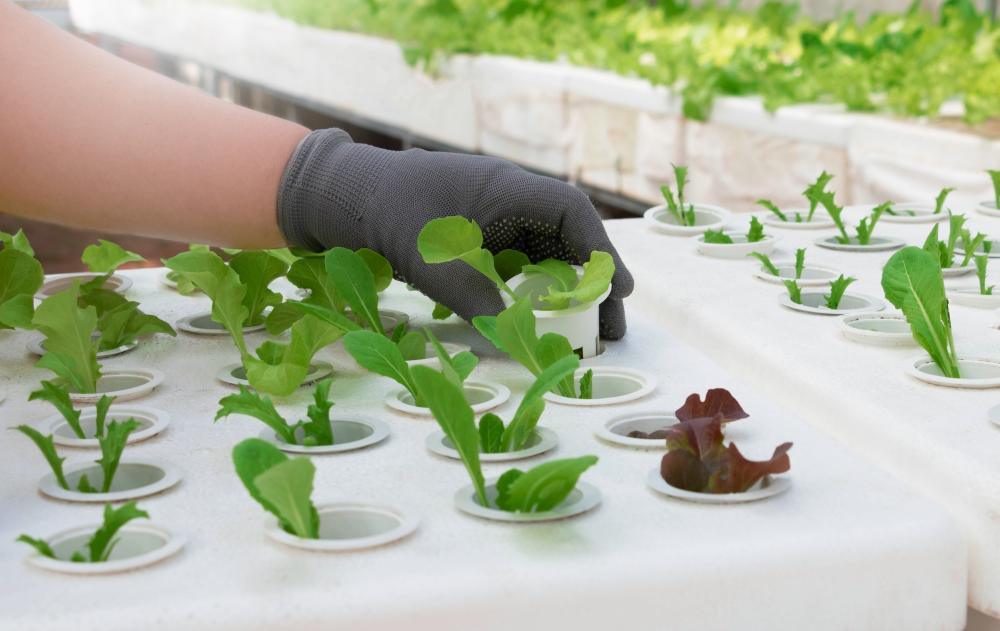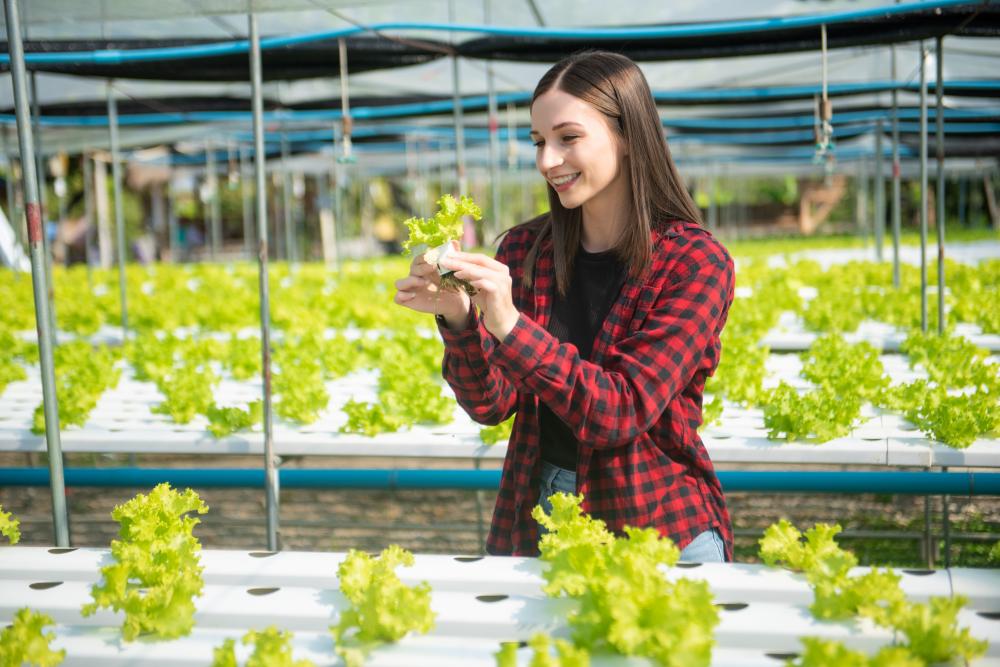Contents
- 1 Introduction to Hydroponic Gardening
- 2 Water: A Precious Resource
- 3 Liberation from Soil: The Unseen Freedom
- 4 Mastering Micro-Climates
- 5 Sustainability and Efficiency in Harmony
- 6 The Urban Farming Revolution
- 7 Labor and Cost Efficiency: Reducing the Burden
- 8 Concluding Thoughts: A Greener Horizon
- 9 What are the pros and cons of hydroponic farming?
- 10 Who benefits from hydroponic farming?
- 11 Why is hydroponics better than farming?
- 12 How do hydroponics help the environment?
- 13 What role can hydroponics play in enhancing food security?

Introduction to Hydroponic Gardening
As guardians of the green, our mission at Lettuce Be Farmers is to illuminate the path for our fellow garden enthusiasts towards more sustainable and efficient gardening methods. Hydroponics, a method where soil takes a back seat to water, deserves the spotlight for a myriad of reasons. Delving into the world of hydroponics unveils a treasure trove of Hydroponics Advantages–from saving water to boosting crop yields.
Water: A Precious Resource
Reimagining Use and Conservation
In traditional gardening, vast amounts of water vanish into the ether through evaporation and runoff. Hydroponics pivots on this axis, recirculating water and nutrients directly to the roots of plants, dramatically decreasing waste. This clever reuse of water not only slashes the volume needed but also marks one of the most pivotal Hydroponics Advantages.
Liberation from Soil: The Unseen Freedom
Ask any gardener about the trials of soil, and you’ll hear tales of battles with pests, diseases, and the constant quest for balance. Hydroponics sidesteps these earthbound issues, offering plants a nutrient-rich solution devoid of diseases that soil might harbor. This transition from soil to a water-based environment highlights an often overlooked advantage of hydroponics–healthier, happier plants leading to greater yields.
Mastering Micro-Climates
Every Plant’s Dream Environment
One of the most mesmerizing aspects of hydroponic systems is the ability to tailor micro-climates to the specific needs of each plant. Traditional farming is at the mercy of Mother Nature, while hydroponics allows us to control temperature, humidity, and light with precision. This control is not just about pampering our plants; it’s about optimizing conditions for growth year-round, making it a game-changer in the quest to feed an ever-growing population.
Sustainability and Efficiency in Harmony
At Lettuce Be Farmers, our hearts lie with the future of our planet. Hydroponics offers a beacon of hope in the sustainable agriculture sphere. The method uses significantly less land and water than traditional farming, proving that we can produce food more efficiently and with a smaller environmental footprint. It’s a testament to what we can achieve when we align our farming practices with the principles of sustainability.
A Path to Greater Yields
Another standout in the long list of Hydroponics Advantages is the potential for higher yields. Though ancient gardeners may have marveled at the mysteries of growth beneath the soil, we now understand that direct nutrient delivery to roots in hydroponic systems encourages faster, more robust growth. This not only means more food from less space but also a quicker turnaround from seed to harvest.
The Urban Farming Revolution
In the concrete jungles of our cities, space is a luxury few can afford. Hydroponics provides a solution to this dilemma, allowing us to grow upwards rather than outwards. Vertical hydroponic systems can transform rooftops, balconies, and backyards into verdant oases. This urban farming revolution brings fresh produce closer to where it’s consumed, reducing the need for transportation and, by extension, our carbon footprint.
Labor and Cost Efficiency: Reducing the Burden
One of the lesser-discussed, yet significant, Hydroponics Advantages is labor efficiency. Traditional soil farming is labor-intensive, from tilling the earth to fighting off pests. Hydroponics streamlines these processes, making it easier to manage and harvest crops. For us at Lettuce Be Farmers, it’s not just about easing the physical toll on farmers but also about creating a more sustainable and enjoyable way of life.
A Cost-Effective Future
While initial setup costs might seem daunting, the long-term savings on water, fertilizers, and pesticides are undeniable. The reduction in labor costs and the increase in crop yields make hydroponics an economically attractive model for the future of farming.
Concluding Thoughts: A Greener Horizon
Embarking on a hydroponic journey with Lettuce Be Farmers is not just about embracing a gardening trend. It’s about opening our minds to innovative solutions for food production that are kinder to our planet. The Hydroponics Advantages are clear–less water, no soil, controlled environments, year-round growing, and space efficiency. As we continue to face global challenges, hydroponics stands as a beacon of sustainable, efficient agriculture. United in our passion for gardening, let’s sow the seeds of change and cultivate a greener, more bountiful world.
- Water conservation through innovative recycling practices.
- The liberation from soil and its associated growing challenges.
- Customizable micro-climates for optimal plant growth.
- A harmonious blend of sustainability and efficiency.
- Higher yields from less space–a boon for food production.
- Urban farming that breathes life into city spaces.
- Reduced labor and cost efficiency leading to a sustainable future.
Whether you’re a seasoned green thumb or a curious newcomer, the world of hydroponics offers a fertile ground for growth, discovery, and innovation. Join us at Lettuce Be Farmers as we delve deeper into the possibilities and promise of hydroponic gardening.

What are the pros and cons of hydroponic farming?
Exploring the world of hydroponic farming reveals a landscape ripe with benefits, yet, like any farming method, it carries its complexities. The most striking advantage lies in water conservation. By recirculating, hydroponics uses up to 90% less water than traditional soil farming. Additionally, it allows for higher yields in smaller spaces, a boon for urban growers. The absence of soil also negates soil-borne diseases and pests, reducing the need for pesticides. On the flip side, hydroponics requires a higher initial investment in setup and technology. It also demands a consistent supply of electricity and a basic understanding of nutrient solutions, which might pose a challenge for beginners. But remember, every garden started as just a bunch of seeds. What’s your next step towards greener practices?
Who benefits from hydroponic farming?
Hydroponic farming casts a wide net of benefits that touches not just the green-thumbed enthusiast but practically anyone eyeing sustainable practices. Urban dwellers find a special ally in hydroponics, turning rooftops and balconies into productive green spaces. Educators use hydroponic systems as dynamic, living classrooms, teaching biology, chemistry, and environmental science in a hands-on way. Small business owners, especially in the food industry, can cultivate their own fresh produce, elevating farm-to-table concepts. Even large-scale operations find hydroponics an efficient way to produce food more sustainably and meet the demands of a growing population. So, whether you’re a hobbyist or a professional, the soil-less sky’s the limit. How might hydroponics fit into your life or business?
Why is hydroponics better than farming?
Calling hydroponics ‘better’ than traditional farming might stir some debate, yet it’s undeniable that hydroponics offers compelling advantages in certain scenarios. Traditional farming is deeply rooted in our culture and is essential for producing a wide variety of crops. However, hydroponics shines in its efficient use of resources. The control over variables such as nutrients, light, and water drastically reduces waste and maximizes production, particularly in non-arable areas or urban settings where space is scarce. Additionally, hydroponics can yield crops all year round, independent of seasons, providing fresh produce even in harsh climates. It’s not about replacing traditional farming, but rather complementing it to tackle the diverse challenges of modern agriculture. In what ways do you think hydroponics and traditional farming could coexist?
How do hydroponics help the environment?
Hydroponics offers a green thumbprint on the environment in several impactful ways. The most notable is water conservation. By recirculating water, hydroponics dramatically reduces consumption, a crucial benefit in drought-prone regions. Moreover, it diminishes agricultural runoff, a major source of water pollution. Since hydroponic systems can be set up anywhere, they reduce the need for deforestation and land conversion for agricultural purposes. Additionally, by localizing production in urban centers, hydroponics cuts down on the carbon emissions associated with transporting food. It’s a powerful example of how technology and traditional farming methods can come together for a healthier planet. Thinking of making a difference? What’s your first step towards a more sustainable future?
What role can hydroponics play in enhancing food security?
Hydroponics holds a promising key to unlocking food security, particularly as climatic conditions become less predictable and urban populations soar. This soil-less farming method is not constrained by the traditional agricultural calendar, enabling year-round cultivation and significantly higher yields per square foot. It opens up the possibility of fresh produce in food deserts and areas with poor soil quality. Additionally, hydroponics can be scaled from small home setups to large commercial operations, offering flexibility to meet local and global needs efficiently. It’s an innovation that’s not just about growing food differently but also about thinking differently about how we ensure everyone has enough to eat. Have you considered the potential of hydroponics in fighting food insecurity?
Hydroponics Resources
- U.S. Geological Survey – Water Resources – Learn more about water conservation and innovative recycling practices.
- USDA Natural Resources Conservation Service – Discover the benefits of liberation from soil and its associated growing challenges.
- USDA Climate Change – Explore customizable micro-climates for optimal plant growth.
- Environmental Protection Agency – Sustainability – Dive into the harmonious blend of sustainability and efficiency in hydroponics.
- FDA Food Safety Modernization Act – Understand how hydroponics can lead to higher yields from less space.
- EPA Smart Growth – Learn about urban farming that breathes life into city spaces.
- U.S. Department of Labor – Discover reduced labor and cost efficiency in hydroponic farming.
